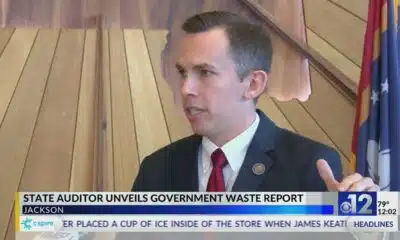Mississippi News
Teacher pay remains afterthought during historic opportunity
Teacher pay remains an afterthought despite once-in-a-lifetime financial opportunity
In Senate Education Committee Chairman Dennis DeBar’s fifth and final stop on a statewide listening tour to talk with teachers about their pay, the first question he heard wasn’t about why Mississippi ranked last in the nation in average teacher pay.
It wasn’t about why Mississippi teachers must pay for classroom supplies out of their own meager paychecks, about the extra but uncompensated responsibilities teachers have had to take on during the pandemic, or about how much lawmakers planned to raise teacher salaries in the upcoming legislative session.
“How do we know this isn’t another publicity stunt?” Leslie Hebert, an English teacher at Pelahatchie High School, asked bluntly.
Hebert’s question underscored a long-standing reality: Mississippi teachers, underpaid and underappreciated, distrust elected officials who say they want to help. They’ve been lied to too many times.
Every election cycle, statewide officials and lawmakers focus on promises that they’ll raise teacher pay. But once they’re in office, they produce few results. Since 2007, lawmakers have increased Mississippi teacher pay just four times. Those raises have hardly moved the needle.
After all these promises and all these years, Mississippi still boasts the lowest average teacher salary of any state in the nation. The state is facing a dire teacher shortage: there has been a 32% decline in education graduates from 2013-14 to 2017-18, and the out-of-state pipeline for teachers has almost entirely vanished. Many teachers must work multiple jobs to pay their bills.
Educators fume about the lack of action at the Capitol. All they can do is hope for change or seek new professions. If things keep going in this direction, teachers will eventually be just “warm bodies in a classroom,” as Trisha Gilbreath, a teacher in the Rankin County School District, put it.
“Good teachers are competent humans, and competent humans are going to realize really quickly they can do something a lot less demanding and make more money,” she said.
Lawmakers return to Jackson on Jan. 4, 2022, with more money to spend than at any point in the state’s history. Billions in unspent state surplus — not including the billions in untouched federal coronavirus stimulus funds — are awaiting legislative negotiation.
But thus far, even as lawmakers have spent weeks discussing in detail how to spend the unprecedented money, no specific plan has been pitched to increase teacher salaries — neither long-term solutions to the decades-long problem nor short-term fixes to placate exhausted educators.
“We’ve had a lot of politicians do things like these town hall meetings, and nothing ever changes,” Hebert said. “We may get very, very small changes in teacher pay but along with those small changes are increases in insurance premiums, deductibles, and out-of-pocket expenses. It just feels like we’re spinning our wheels.”
The most common refrain educators hear from elected officials is: “We want Mississippi teachers to reach the Southeastern average.”
Late in his 2019 campaign for governor, Tate Reeves emailed every public school teacher in the state and promised his plan would “get our salaries to the Southern Regional Education Board starting average within two years and the Southeastern regional average within four years.”
Reeves, during his first year as governor, left teacher pay out of his budget proposal completely. Teacher salaries have been raised just once since Reeves has been governor — a $1,000 raise passed in the 2021 session. Two years later, none of the governor’s promises have been fulfilled.

Speaker of the House Philip Gunn, speaking at a Rotary Club meeting during his election year in 2019, also cited the statistic while talking about teacher pay.
“Do we pay them what they’re worth? Absolutely not,” Gunn said. “There’s no way we can ever pay teachers what they are worth. Teachers are invaluable. They are critical to the future of this state. They are critical to the education of our children.”
“I’d love to get them up to the Southeastern average,” Gunn continued. “That, to me, is the first goal. We’re about $4,000 off from there.”
The most recent data available shows Mississippi’s average teacher pay is $46,843 — more than $8,300 behind than the Southeastern average of $55,205, according to the Southern Regional Education Board.
Lt. Gov. Delbert Hosemann took the idea about reaching the Southeastern average a step farther.
“I’ve never been held to a standard that we’ve got to meet some average,” Hosemann said in January 2020, the month he took office as lieutenant governor. “Why do we have to be average? Why can’t we be above?”
DeBar, the Senate Education chairman, conducted his five-stop listening tour in part to fulfill that promise from Hosemann, who presides over the Senate.
As teachers took turns speaking at the Dec. 9 town hall, several themes emerged — including that the recent pay raises were not only not enough to make up for increased insurance costs, but they did not keep up with the pace of inflation, as a more recent report from the Southern Regional Education Board pointed out.
“In the last 10 years, I’ve lost money every single year because I get a step increase, but the insurance and cost of living goes up,” a teacher at the event told DeBar. “$9,000 (annual pay raise) is where we need to be starting.”
DeBar, in response, delivered a blow to the teachers in attendance and countered what the most powerful elected officials have promised time and time again.
“I don’t disagree with you that we need a teacher pay raise and it needs to be substantial,” DeBar began. “… But I don’t know that we’ll ever equal the Southeastern average because every time we do a pay raise, the other states do a pay raise.”
When pressed about how much, exactly, DeBar and lawmakers would work to raise teacher salaries in 2022, DeBar never offered any specific numbers.
He did, however, refer to the governor’s executive budget recommendation, which included a $3,300 increase over three years. DeBar also alluded to a “competitive salary” and a “professional wage,” but when one teacher asked him to define those terms, he did not.
When pressed by teachers to define those terms, Leah Smith, the lieutenant governor’s deputy chief of staff, went on to explain Mississippi’s teacher pay scale to a room full of Mississippi teachers who are intimately familiar with the teacher pay scale.
“We’re still working out the details,” DeBar said.
Hebert, the teacher who asked the first blunt question of DeBar, described how her former coworkers in the Yazoo County School District have not seen any actual pay increase after the recent raise.
The reason, she said, is increased health insurance costs coupled with Yazoo County’s small supplement (or an additional bump in a teacher’s pay that comes from local tax dollars) to most of its teachers.

The Southern Regional Education Board highlighted this issue last year in a report analyzing teacher pay, which found the take-home pay of new and mid-career teachers in Mississippi is low compared to other states in the region.
According to the report, a typical first-year teacher who does not have any family members on his or her health insurance will take home an average of $25,000 (after insurance, retirement and other costs are deducted from their pay). By their 15th year on the job and once he or she has added family members to the insurance plan, that number only rises to around $27,000. The health insurance family plan alone is close to $800 a month.
DeBar, who lives in southeastern Mississippi a few miles from the Alabama state line, said he has seen the effects of this with his own eyes.
“My teachers are leaving Mississippi to go to Alabama,” where health insurance costs for families are significantly lower because the state pays for a larger percentage of the premium, he said.
The Dec. 9 meeting did seemingly little to address another concern of the teachers: the lack of value they feel state leaders place on them and the need for increased support of educators. At times during the listening session, DeBar exacerbated that feeling.
Gilbreath, who teaches AP Calculus and Engineering at Northwest Rankin High School, told DeBar that even with a doctoral degree, 16 years of experience and National Board Certification, she still works a second job to get by.
She is currently a finalist for the Presidential Awards for Excellence in Mathematics and Science Teaching, the nation’s highest honor for teachers of mathematics and science. She has received numerous awards and recognitions for the caliber of her teaching.
When Gilbreath shared that she has a doctoral degree, DeBar said: “You’re one of 400 to 440 PhDs that are still in the classroom … Do we even really need you to have a doctorate in the classroom to teach? Or is a masters degree…”
Gilbreath cut him off.
“I do,” she said. “And it makes me a better teacher. Don’t we want the best teachers in the classroom?”
Gilbreath later said his comment was a “gut punch.”
“I think what Senator DeBar said reflects what society doesn’t understand about education,” she told Mississippi Today. “You have to be good at your content knowledge, and you have to be good at pedagogy. Those are two separate skills.”
When lawmakers return to Jackson in January, they’ll have an unprecedented $4.2 billion in excess funds to spend. That total includes $2.4 billion in state surplus revenue, and $1.8 billion in federal coronavirus relief funds.
Much of $4.2 billion pot of cash is considered one-time money, which lawmakers avoid appropriating for recurring expenses like increased salaries. But the revenue surplus — which could be used for teacher bonuses, among countless other things — is being touted as a sign the state is in its best-ever financial shape, and ideas are being floated about how to invest in it to provide a better future for Mississippi.
Battle lines are currently being drawn between House and Senate leaders over how that money should be spent. Hosemann, the Senate leader, created a select committee to hear from leaders from many sectors of government about how lawmakers should divvy up the federal money.
One group noticeably missing from Hosemann’s federal spending hearings: teachers. The Mississippi Department of Education and school districts received American Rescue Act Plan funds directly, but they are limited in how they can spend them.
In September, the Senate Education Committee hosted a one-day hearing about teacher pay. The idea, DeBar said at the time, was “to glean, learn as much information as possible about teacher pay and the benefits that go with the salary teachers receive. We are looking at what we can do to retain teachers and entice education students to go into teaching.”
One group noticeably missing from that teacher pay hearing: teachers. Instead, they were asked to provide written comments to the committee. Senate leaders later said teachers weren’t invited to testify because there would be a statewide listening tour.

Hosemann said the goal of the state’s historic revenue surpluses should be to ensure the impact for the state “is generational, not for one or two years, but for one or two generations. I think all of the members of this committee are committed to doing that.”
But the notion of all this excess funding has sprung talks — led by Speaker Gunn and Gov. Reeves — of eliminating the state’s income tax, which accounts for about one-third of the state’s annual general fund revenue. That revenue is what funds many essential government services, including the funding formula that pays public school teachers.
“I would challenge both (legislative) chambers, let’s find a way to get rid of the income tax,” Gunn said on Dec. 7. “Now is the time to give money back to the people. We have done everything. We have funded all of the government. We have excess money. Let’s give it back.”
Many teachers fear what will happen to their own salary prospects if one-third of the state’s revenue vanishes in a tax cut. The distrust of elected officials runs deep.
“When I make a commitment, I keep it,” Reeves said in his election eve email to every Mississippi teacher during his 2019 gubernatorial campaign. “I am committed to getting this done for our teachers, our parents, and most importantly, for the kids across Mississippi who are counting on us to get this right.”
“House Republicans believe if we are going to improve our educational system, we must invest in good teachers,” Gunn said in a statement posted on his campaign website. “… Everything we are proposing is being done from the mindset that we have to invest in good teachers. Because we are making ourselves more competitive with our surrounding states, we will be better able to retain our good teachers and give those good teachers outside our state a reason to consider coming here.”
“Our teachers are the professionals with whom we trust our children for eight or more hours a day, and their pay should reflect the critical importance of this calling,” Hosemann said when he was running for lieutenant governor in 2019. “We have more work to do on raising our teacher salaries, and we will not just focus on the issue during election years. We also have to review strategies to end the teacher shortage impacting many of our districts. Pay is also part of this equation.”
That political rhetoric rings hollow in 2021, as Mississippi teachers continue to struggle.
Leaders are touting what they call devoted attention to teacher pay, but they’re not hearing the teachers who have been clearly articulating that they need more. Elected officials can’t stop repeating that Mississippi is in great financial shape, but many teachers aren’t paid living wages. Ideas are being floated at the Capitol for how to leverage this once-in-a-lifetime pile of cash to create “generational” change, but teachers feel they’re being left out of the conversation.
During the Dec. 9 listening session, DeBar referenced a teacher who was in attendance at a previous session whose children qualified for Medicaid because of her income level.
That teacher had to leave the evening session early to go to her second job.
This article first appeared on Mississippi Today and is republished here under a Creative Commons license.
Mississippi News
Death toll from catastrophic Texas flooding passes 100
SUMMARY: Catastrophic flooding in Texas over the July Fourth weekend killed at least 104 people, including 28 children, mostly near Camp Mystic, a century-old girls’ summer camp in Kerr County. Search-and-rescue teams continue to search swollen rivers for dozens still missing; officials expect the death toll to rise as more rain threatens the saturated area. Many victims were swept from cabins by flash floods early Friday, some clinging to trees. Authorities will investigate warnings and evacuation delays, noting poor cellphone service hindered alerts. Despite warnings issued before the flood, some residents didn’t receive them. President Trump plans to visit the state.
The post Death toll from catastrophic Texas flooding passes 100 appeared first on www.wjtv.com
Mississippi News
LIVE: Officials give updates on Texas floods
SUMMARY: Crews in central Texas continue searching for victims after catastrophic July Fourth weekend flooding killed over 80 people, including 27 campers and counselors at Camp Mystic along the Guadalupe River. The floods, some of the worst in decades, struck overnight, sweeping away tents and cabins. With more rain forecast, authorities warn the death toll may rise as many remain missing. Survivors described clinging to trees or fleeing to attics. Officials face scrutiny over flood warnings and emergency response. President Trump declared Kerr County a disaster area, pledging support while criticizing FEMA’s performance.
The post LIVE: Officials give updates on Texas floods appeared first on www.wjtv.com
Mississippi News
Texas floods: At least 51 dead, 27 girls still missing as search efforts continue
SUMMARY: A devastating flash flood struck a summer camp along Texas’ Guadalupe River, killing at least 51 people, including 15 children, with many missing, mainly from Camp Mystic. The floodwaters surged 26 feet in 45 minutes early Friday, washing away homes and vehicles. Rescue teams face challenging terrain, using helicopters, boats, and drones to search for survivors amid debris and broken trees. Authorities are scrutinized for potential warning and preparation failures. Gov. Greg Abbott declared a day of prayer, while rescue and recovery efforts continue amid fears of additional flooding. The Hill Country’s flood-prone terrain and unexpected downpour overwhelmed campers and residents, prompting widespread grief and appeals for support.
The post Texas floods: At least 51 dead, 27 girls still missing as search efforts continue appeared first on www.wjtv.com
-
News from the South - Arkansas News Feed6 days ago
Real-life Uncle Sam's descendants live in Arkansas
-
News from the South - West Virginia News Feed7 days ago
Body found in Culvert identified
-
News from the South - Louisiana News Feed7 days ago
Her son faced 10 years behind bars; now she’s the one facing prison
-
News from the South - Georgia News Feed5 days ago
'Big Beautiful Bill' already felt at Georgia state parks | FOX 5 News
-
News from the South - Oklahoma News Feed6 days ago
LOFT report uncovers what led to multi-million dollar budget shortfall
-
News from the South - Arkansas News Feed7 days ago
Could roundabouts become more common than red lights?
-
Mississippi Today7 days ago
Medicaid cuts could be devastating for the Delta and the rest of rural America
-
News from the South - Kentucky News Feed7 days ago
What’s next for Misty Noel after she serves her prison sentence?


















































